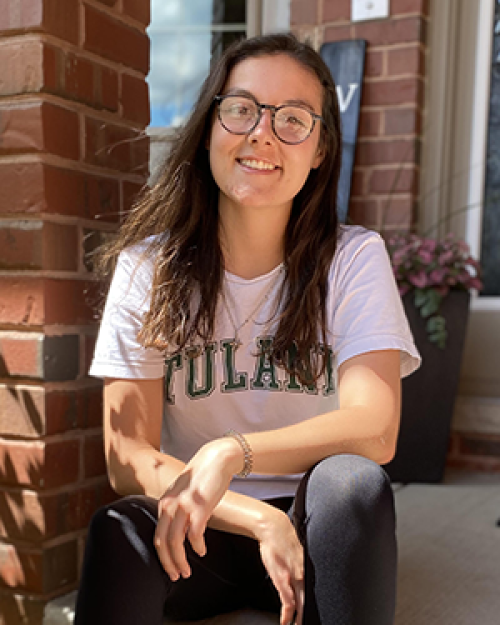The National Science Foundation Awards Fellowships to Three NTC Tulane Alumni
Three recent Tulane alumni have received competitive fellowships from the National Science Foundation Graduate Research Fellowship Program (NSF GRFP). The country’s oldest and most prestigious STEM fellowship program, NSF GRFP seeks to uphold the vitality of the nation’s science and engineering workforce by supporting research-based advanced study for exceptional undergraduate seniors and early-career graduate students. Fellows are anticipated to develop expertise in their research area and make significant contributions toto teaching, innovation, and technologies. This year Helen Weierbach (’20), Sydney Koehne (’22), and Blaine Martin (’23) have received Grant Research Fellowships (GRF) from NSF.

Winning this award will allow Helen Weierbach to complete a thesis-based Masters in the Hydrological Sciences. Her research will focus on employing Machine Learning techniques to learn transfer information from high resolution datasets about how mountainous watersheds in the Western U.S. are responding to hydrological drought.
“Receiving an NSF GRFP gives me more flexibility in my decision of where to attend graduate school. Rather than focusing on schools where I can find funding to support my graduate education, I am now able to choose a school based upon where I can see myself being most supported in my research interests.” – Helene Weierbach (’20)
Sydney Koehne will use the funding to support her research goals while pursuing her Ph.D. in chemistry at Northwestern University and help with her post-Ph.D. plans.
“This award will help me develop my skills as an independent researcher so that I can eventually go on to start my own research lab after I graduate. I hope to be able to tackle original research problems early on in my career as a scientist, and this funding will allow me to do just that!” – Sydney Koehne (’22)

This award will support Blaine Martin in completing his PhD at the University of Illinois Urbana-Champaign in the Department of Plant Biology with Dr. Jim Dalling. In addition to taking classes, teaching, and completing dissertation research, this fellowship will also afford him to conduct extensive fieldwork in Western Panama and potentially new field sites to study plant-fungal interactions.
“Long-term, this award will allow me to focus on research that will lead to publications. With this increased focus through stipend support, this research can be more rigorous and larger scale. I can also focus my grant writing on research-specific funding. Long-term, this results in a more substantive dissertation that can propel me forward in my career." - Blaine Martin (’23)

When asked what they felt made them strong candidates for this fellowship and how it feels to win, the award-recipients offered the following thoughts.
“I think that my research background and my interest in furthering diversity, equity, and inclusivity initiatives in STEM made me a strong candidate. Throughout my undergraduate career and since graduating and working as a Research Associate Berkeley Lab I have applied my background in mathematics to a variety of research projects across the Earth and Environmental sciences. I have also focused on the broader impact of my research in how hydrology can contribute meaningfully to our communities and how we can make STEM fields more accessible to under-represented groups. Receiving this award feels like a huge encouragement to pursue my personal research goals and interests – both in graduate school and beyond!” – Helen Weierbach (’20)
“I believe the strong scientific research and educational background that I received at Tulane made me a strong candidate. At Tulane I was able to explore a wide range of topics in STEM through the courses, labs, and research credits offered by the School of Science & Engineering. My undergraduate research was multidisciplinary, spanning inorganic synthesis, electrochemistry, and physical chemistry, which I believe also helped me prepare a strong research proposal. It feels surreal to win this award! As a first-generation undergraduate/Ph.D. student and gender minority in STEM, this award helps solidify to me that I belong in my field despite a lack of representation in the sciences.” – Sydney Koehne (’22)
“The merit section of my application was bolstered by my experience working in Dr. Sunshine Van Bael’s lab, fieldwork experience at the Smithsonian Tropical Research Institute (STRI) in Panama, completion of an honors thesis in EBIO, leading and collaborating on research for publication, and a current internship at STRI with Dr. Erin Spear. I also showed my passion for mentorship and teaching through my experience tutoring athletes, working as an Undergraduate Teaching Fellow in EBIO, and mentoring K-12 students through the Planting Science program. I feel very proud of myself after the intensive application process and waiting. It makes me even more excited to start graduate school and dive into research questions.” – Blaine Martin (’23)
Since 1952, NSF has funded over 70,000 Graduate Research Fellowships out of more than 500,000 applicants. Currently, 42 Fellows have gone on to become Nobel laureates, and more than 450 have become members of the National Academy of Sciences.
